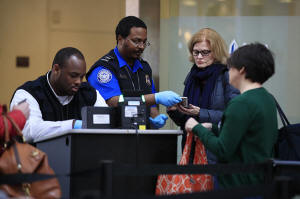Judge grants preliminary injunction to protect collective bargaining
agreement for TSA workers
[June 03, 2025]
By MARTHA BELLISLE
SEATTLE (AP) — A federal judge on Monday granted a preliminary
injunction to stop Homeland Security Secretary Kristi Noem from killing
a collective bargaining agreement for Transportation Safety
Administration workers.
U.S. District Judge Marsha Pechman of Seattle said in her order that an
injunction is needed to preserve the rights and benefits that TSA
workers have enjoyed for years while being represented by the American
Federation of Government Employees.
In their lawsuit, Pechman said, the union has shown that Noem's
directive to end the agreement “constitutes impermissible retaliation
against it for its unwillingness to acquiesce to the Trump
Administration’s assault on federal workers.” It also likely violated
due process and AFGE is likely to succeed in showing that Noem’s
decision was “arbitrary and capricious," she added.
“Today’s court decision is a crucial victory for federal workers and the
rule of law,” AFGE National President Everett Kelley said in a release.
“The preliminary injunction underscores the unconstitutional nature of
DHS’s attack on TSA officers’ First Amendment rights. We remain
committed to ensuring our members’ rights and dignity are protected, and
we will not back down from defending our members’ rights against
unlawful union busting.”
Assistant U.S. Attorney Brian Kipnis declined to comment on the judge's
ruling, according to Emily Langlie, spokesperson for the U.S. Attorney's
office.

AFGE had entered into a new, seven-year collective bargaining agreement
with agency last May, but Noem issued a memo Feb. 27 rescinding that
agreement. One week later, TSA informed the union about Noem's
directive, saying the contract was terminated and all pending grievances
would be deleted.
AFGE filed a lawsuit against Noem, claiming the move was retaliation
against the union for pushing back against the Trump administration's
attacks on federal workers. AFGE had filed a separate lawsuit Feb. 19
against the Office of Personnel Management to stop the firing of
probationary workers. A judge issued a temporary restraining order Feb.
27 stopping the firings — the same day Noem issued her memo.
Abigail Carter, representing AFGE during oral arguments before Pechman
on May 27, said Noem's move was retaliation and a violation of the
union's First Amendment right to protected speech and its Fifth
Amendment right to due process.
“The administration has made it clear that if you don’t disagree with it
politically, you and your members can keep your rights, but if you do
disagree, you lose them,” Carter said. She also argued that the
collective bargaining agreement was necessary because TSA workers are
not covered under the federal labor-management code. The agreement
protects them from dangerous working conditions and unreasonable hours.

[to top of second column]
|

Transportation Security Administration workers screen airline
passengers at Reagan Washington National Airport in Washington,
Monday, Jan. 28, 2019. (AP Photo/Manuel Balce Ceneta,File)

Kipnis denied the retaliation claim and said it was simply a
difference in management styles.
Pechman questioned that contention. Not all unions are banned by the
administration, Pechman said, only the ones oppose the
administration.
“Isn’t this a pattern that you see?” Pechman asked Kipnis.
“Attorneys who take opposition stances get banned. Those who don’t,
don’t have those restrictions. Isn’t this the pattern that the White
House has set up?"
Kipnis said tension between unions and management are common and
this conflict doesn't signal a violation of the workers' First
Amendment rights, but instead reflects a confrontational
relationship.
But Pechman wasn't convinced.
Previous TSA managers have found unions to be beneficial and renewed
their contracts for years, she said. They found they made a happier
workforce, and “they wanted their employees to feel that they were
well-treated,” she said. What has changed is this administration's
attitude, she said.
To that, Kipnis replied: “Or you could characterize it as a
different management style. The former administration apparently saw
that as a better way to do business. ... But this administration
sees a different way of doing business. And the same statute affords
them the same amount of discretion.”
Pechman said she understood that the administration has the right to
exercise that discretion, “but to abruptly cancel doesn’t seem well
reasoned, so I’m having trouble with that." She also noted, "But why
the United States gets to back out of contracts that it’s made is
harder to accept.”

In Monday's order, Pechman said TSA workers would suffer
“irreparable harm” without the injunction, noting that if they lose
their collective bargaining agreement, they will lose the benefits
it provides.
“While the loss of money alone does not show irreparable harm, the
total harms here are more than monetary,” Pechman said. “They
include the loss of substantive employment protections, avenues of
grievance and arbitration, and the right to have a workforce that
can unite to demand benefits that might not be obtainable through
individual negotiation.”
All contents © copyright 2025 Associated Press. All rights reserved |